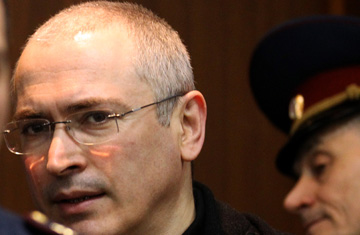
A file picture taken on May 17, 2011, shows Russian ex-oil tycoon Mikhail Khodorkovsky arriving at the courtroom in Moscow
Vladimir Putin will be sworn in as President of Russia on May 7, the victor of a vote whose integrity has been questioned by election observers in Russia and the world over. When challenged by citizens who are outraged by the questionable veracity of the elections it presides over, the Putin regime's favorite response is: "Take it to court!" But in every case the result is the same. The judge pronounces: "The court found no violations."
Those who are used to having independent judicial systems in their countries naturally assume that justice has been done. "The court examined the evidence; it failed to discover any violations," they say. "What else do you want?"
Some eight years ago, when I was on trial for fraud and tax evasion, I too expected justice. Perhaps an individual judge may be biased, I thought at the time, but the judicial system as a whole can't ignore both the law and self-evident facts. Therein lies the error in my reasoning and in the reasoning of those now hoping to dispute the credibility of Putin's March 4 victory in the courts. Simply put, there is no independent judiciary in Russia, and this means no judiciary at all, at least not in the customary sense of the word. A Russian judge must either carry out an order he or she has been given — a practice that transforms the judge into an ordinary government bureaucrat — or leave the system.
During my eight years of incarceration, I have come across several examples of judges who have openly admitted that they are powerless to act independently. An acquittal or a decision that goes against instructions from above will simply be overturned, the judge will tell the defendant, and then they'll both be punished. Russian judges typically acquit less than 2 in 100 defendants; some estimates say it's less than 1 in 100. Legal experts and rights advocates believe that Russian prisons hold tens of thousands of people unlawfully convicted in fabricated cases.
(PHOTOS: On the Trail with Putin: Photographs by Yuri Kozyrev)
Ask any of Putin's siloviki — his strongmen from the intelligence services and military — and they will tell you with a smirk that criminals always claim that they're innocent. The opposite is true. In the twisted world of Russia's judicial system, many innocent people actually claim that they're guilty, even if they do try to justify their behavior by claiming they were drunk or stupid or made a mistake. Everyone knows: a confession gets you a much shorter sentence and the possibility of an early release. And everyone also knows that those who won't play ball with the prosecutor are still going to be convicted one way or another. Their intransigence means they will have to serve their full terms. Lengthy terms, at that.
And yet even knowing what corruption and long odds they face, some of the falsely accused still choose to fight it out to the end. Are they stupid? No. They simply value their own dignity too much to give in.
As Putin reclaimed power, it was this same desire to maintain their dignity that brought my fellow citizens out onto the streets of Moscow, St. Petersburg and other cities to protest against the theft of their votes. One of the first demands of the protesters was the establishment of an independent judiciary and freedom for political prisoners. More and more of my fellow citizens are beginning to understand the cost of what passes for justice in Russia today.
The main feature of the Putin regime, though, is its deceitfulness — from the very top, all the way down. Corruption, stealing from the treasury, persecution of political opponents — all these are consequences of the deep immorality of this government, a government that is more comfortable with smears and evasions than with transparency.
My generation carries the blame for having enabled them to lie to us. We allowed them out of indifference, but even more so, out of fear.
We see ourselves through the eyes of the next generation and through the eyes of those who participate in the rallies, and we feel shame. Those in the younger generation are different from us: they have no fear.
For their sake, we are beginning to stand taller at last. We are beginning to stand taller in the deceitful courts and on the streets of our cities. Yes, we are still afraid, but now, even more than that, we're ashamed in the presence of our children. And we can't be made to bend anymore.
Khodorkovsky, former head of the defunct oil company Yukos, has been in prison since 2003
